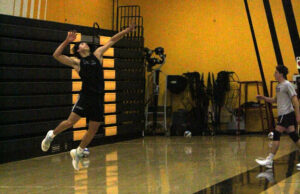The stress of college athletics

The process of applying to college is possibly the most stressful point of any student’s life. For an athlete, it’s the time where they can finally see if the hours spent at practice, weekends given up for games and tournaments, and sleep lost to manage their school workload along with their sport were worth it. The fruit of their hard work comes in the form of a college scout recruiting them to play for the university’s sports team. Being a college athlete can be a stepping stone to a career as a professional athlete or help athletes obtain scholarships for college. Regardless of the university, the sport, or the athlete, everyone can agree the process is stressful and exhausting for anyone experiencing it.
Wayne Mazzoni, Division 1 pitching coach for Sacred Heart University in Connecticut and expert in college recruiting, offers the perspective of the process from the other side. He tells Rick Wolff, the creator of a website about sports issues for children and parents, that an often overlooked but extremely vital focus for any prospective college athlete are their high school grades.
He states that often times athletes come into college with confidence that they will become the team’s star athlete, but then are forced with the reality where injuries and lack of playing time cause the majority of players to quit before finishing college. Good high school grades also open up opportunities for academic scholarship as financial assistance. Assuming that all athletes are granted full ride scholarships is a common misconception according to Mazzoni. He states that full rides are rarely granted outside of men’s basketball and football.
The process is so cut throat that athletes and recruiters go to intense extremes. J.C. Shurburtt, a football scout for, recounts a particular event involving a highly sought out player named James Wilder Jr.. Shurburtt received an email from him expressing his commitment to Florida. Shurburtt proceeded to tweet out this information which was picked up my many sports magazines and news outlets. After the information went viral, Shurburtt was informed that the entire situation was a hoax created by a fake account. People go to such ends to make or break someone else’s college sports career.
Some athletes are under such pressure from the magnitude of the decision that they change their commitment at the last possible second. Jimmy Williams, a sought after quarterback in the 1990s, was being recruited by many prestigious universities and had decided to sign with Northwestern. Mitch Light, a recruiter for Vanderbilt, recounts his experience recruiting Williams. Vanderbilt was not nearly as solid an option as Northwestern, but in the last minute, Williams changed his decision due to a supposed revelation from God. Some athletes choose to put all their efforts into their success in their respective sport, others are catfished into signing for the wrong school, some carefully contemplate their decision, while yet others choose to make their decision on their faith; but one cannot deny the stress of being recruited to play college sports.
People tend to stress out too much about athletics. The high stress environment is constantly compromising a student’s ability to have a social life and academic success. I think that the process should be altered to alleviate some of the stress. The cutthroat nature of the process is unhealthy and often causes students to burn out. Students like the aforementioned Jimmy Williams, are so overwhelmed by the immensity of the decision that they change everything on a hail Mary. Colleges and high schools should work to implement measures to make the process less stressful for students. That being said, sports are a great way for students to get financial help and boost their sports careers.



